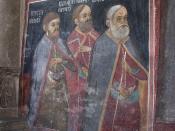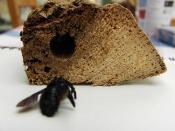Implying a Pedophile
In "The Walrus and the Carpenter," by Lewis Carroll, the dual identity, the oysters, the eating of the oysters, and the implied guilt felt afterwards, can lead a reader to believe the poem is about a pedophile. Many people on various websites claim that Lewis Carroll was a pedophile because of his interest in young girls (Encarta). He has taken many pictures, mostly of young girls, and a lot of them nude. However, there are no facts to prove this theory because his family members purposely removed many of his journal pages (Susan Maskin). People feel they did this to hide the fact of him being a pedophile. Like all poetry, this poem can have many different meanings and interpretations, but many people believe Lewis wrote this poem as a reflection of himself.
The author flips back and forth with the dual identity of the Walrus and the Carpenter.
Throughout the first half of the poem, one thinks the Walrus is the good side of the personality and that he tries to change the Carpenter to a better person. However, as the poem goes on, the Walrus is eager to eat the oysters, but then switches back to the good side at the end. The Walrus is one of the two personalities; the Carpenter is the other one. The Walrus is the better of the two personalities most of the time. The Walrus then starts conflicting with himself, with trying to paint an image that is not there. With explaining the sun being out, but then contrasting by saying, it was the middle of the night. In the second stanza, the moon represents the bad side of the two identities. The poem then states: "moon shining sulkily, because the sun had no business to be...


